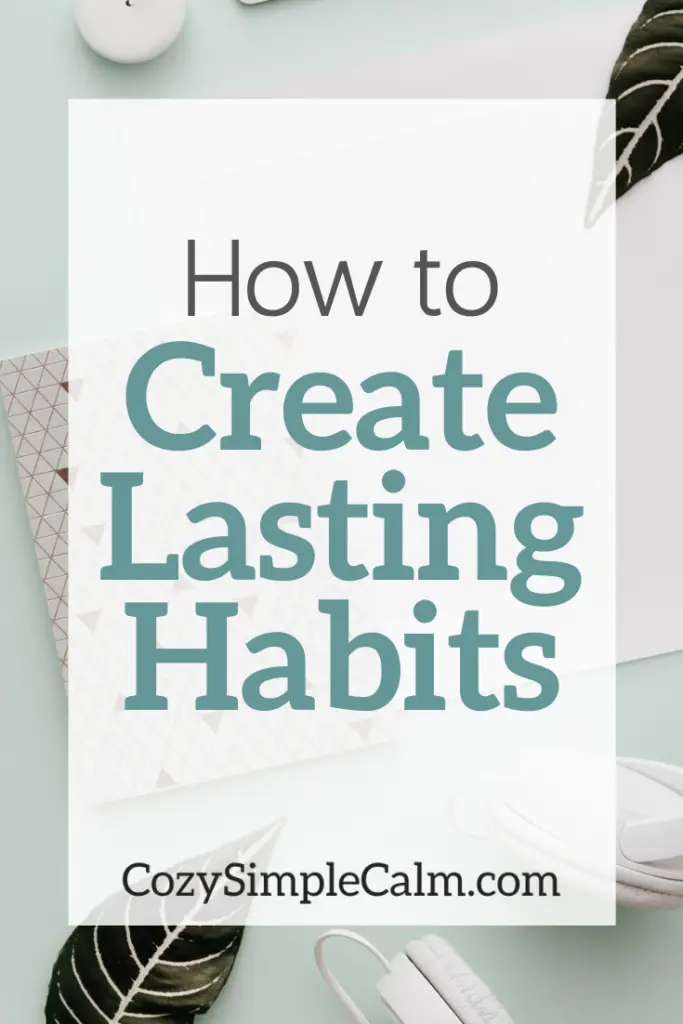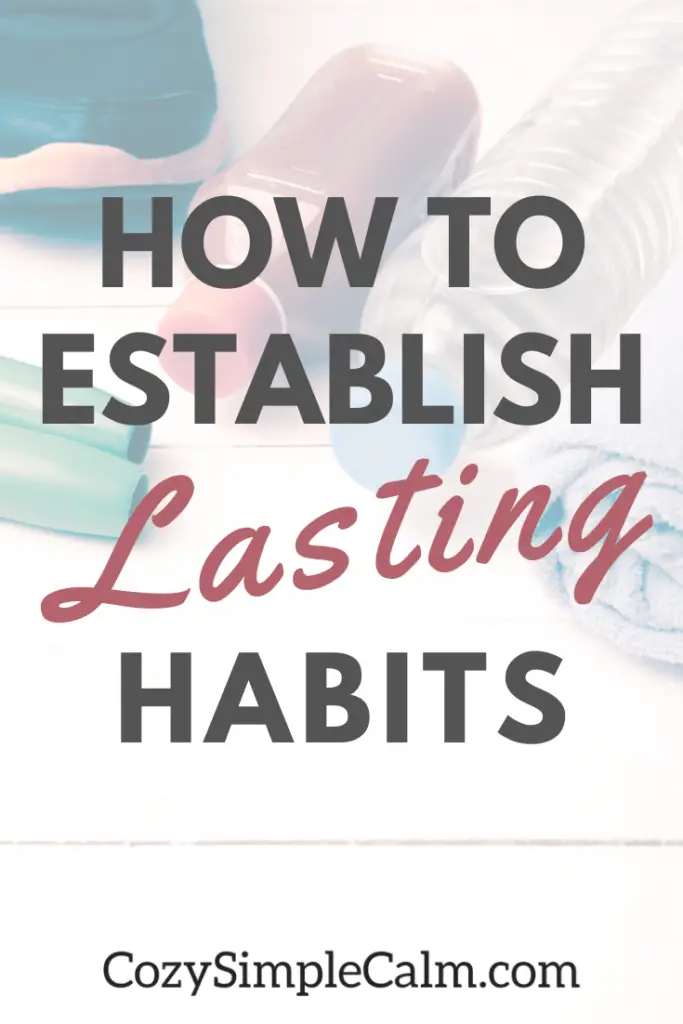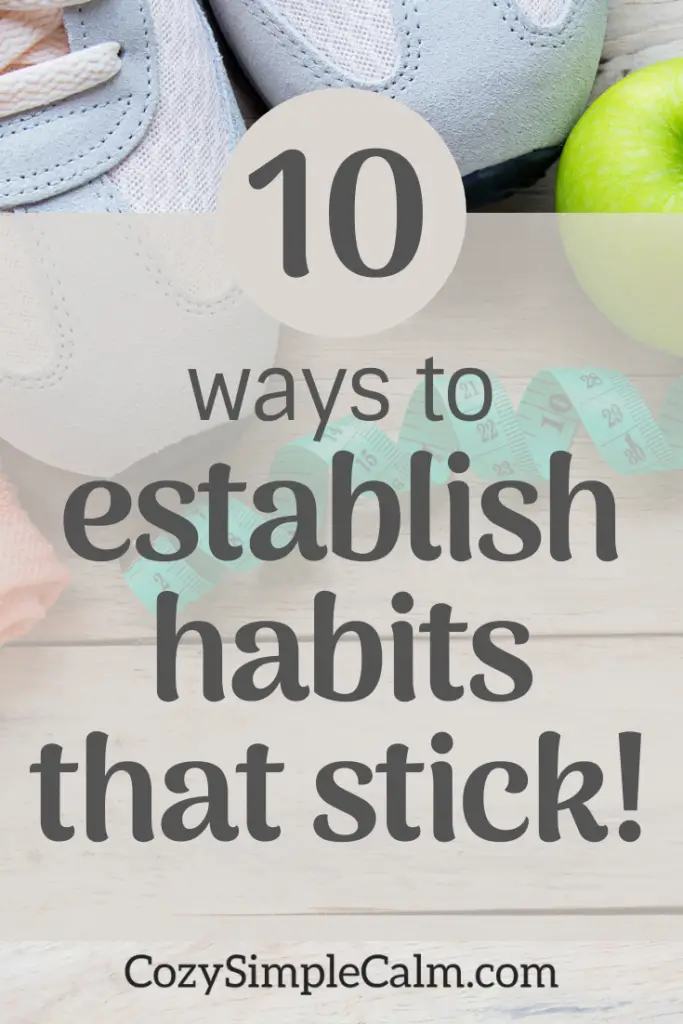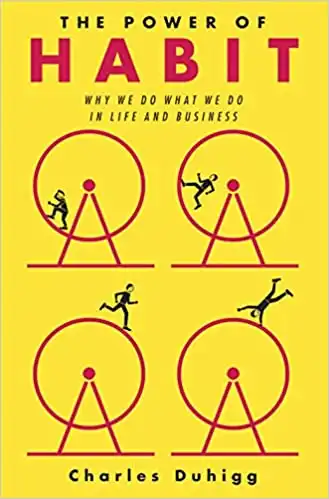
Note - Affiliate links may be used in this post, including Amazon affiliate links. I may receive a small commission at no extra cost to you if you use my affiliate link. But don't worry, all the opinions expressed are my own!
How to create lasting habits
Self-improvement is all about creating good habits. But how do you make those new habits really stick? Read on to learn some of the best ways to create lasting habits.
I’m writing this at the very beginning of a brand new year. For the last few weeks (and probably for the next few weeks), my social feed has been taken over with everyone’s new year’s resolutions and goals. That’s not a bad thing! It’s inspiring to see so many people determined to make positive changes! But those resolutions always seem to have an undercurrent of “I’m going to change my entire life, all at once!”
Not a bad concept…who wouldn’t want a nice, quick “life makeover”. But it may not be the most practical way to make lasting changes. And it definitely doesn’t have to happen at the beginning of the year!
So how can we start to create long-lasting habits outside of the big “New Year, New Me” moment that happens on January 1st?
Why habits are important
Before we get to that, we need to talk a little about what makes something a “habit” and why that’s important. A habit is a task or routine that you do, regularly, at the same time or on the same day. It’s something that you no longer have to really think about or even put that much effort into because it’s just a part of your routine. Once a habit is established, it’s just what you do, almost on auto-pilot. And that’s why it’s so important to intentionally create GOOD habits.
That’s also why it’s so hard to break bad habits. But every habit, good or bad, starts as a choice. You make the choice to do this instead of that. You make the choice to create a habit, either by intention or by lack of intention.
So when you decide it’s time to create a new habit, why is it so hard to make it a lasting habit?
Why new habits fail
There are a few reasons why new habits don’t always stick. The hardest part of forming a new habit is the “new” part. It’s quite literally not a habit yet, so you have to be intentional about it. Until it actually becomes a habit, you have to make the conscious decision, each time, to do this instead of that. And, I’m not going to lie, that takes a lot of effort, especially at first. It’s all too easy to say “Eh, I’ll just start tomorrow instead.”
Also, forming a new habit almost always goes hand in hand with changing an old habit or routine. And change is hard. It’s easy to slide right back into the old routine instead of focusing on the new habit you’re trying to create. Creating a new habit? It sucks at first. Because you’re rewiring your brain and your normal routine.
Another reason new habits fail is simply that we try to do too much at once. Or try to get them “perfect” right from the start. It’s all or nothing. We go in with the idea that we either do all parts of this “new lifestyle” correctly from day 1 or we give up entirely. (Fellow perfectionists, check out this post for more on why the “all or nothing” approach does more harm than good.)
Any of these sound familiar? Probably. I’m willing to bet that every single person who has tried to create a new habit has dealt with at least one of those reasons. So let’s talk about a few ways to stop that cycle!
How long does it take to create a new habit?
First, let’s talk about some realistic expectations. Exactly how long does it take before a new habit becomes just a habit? A routine that sticks, that you don’t have to think that much about, and you will pretty much just do on autopilot?
The answers to that question vary…a lot. 21 days, or 3 weeks, seems to be a common answer. Some recent studies even say that 66 days is the “magic number” until something truly becomes a habit.
But I don’t think there is a “magic number”. I think it depends entirely on the person AND the habit itself. Especially if the new habit you’re creating is tied to breaking a bad habit that’s already an established pattern in your life.
The amount of time that it takes you to go from putting extra effort into making sure it happens, until a habit actually becomes part of your routine, might be different for every habit you establish. But just to have a time frame to go on, I usually use a month as a good rule of thumb. Aim to make that change consistently for an entire month. By the end of that month, even if it’s not at the autopilot stage, a new habit will be well on its way to becoming your new normal. Even if it’s still a struggle at the end of the month, look back and remember how much harder it was on day 1. Habit creation is definitely a case of progress over perfection!


How to create lasting habits
So how do we make these new, little baby habits stick? How do we get past the “new” part and get to the “habit” part? Here are 10 ways to create lasting habits:
1. Use a habit tracker
One of the hardest parts of creating a new habit is not seeing immediate results. You can’t eat one salad and expect to be in amazing shape. (Wouldn’t that be great though?) You can’t wake up early for one day and expect not to want to hit the snooze button the next morning.
This is where a habit tracker comes in. Before you can see tangible results in your life to keep yourself motivated, use a tracker as visual motivation to keep going. Seeing those little boxes checked off is so satisfying!
There are lots of different ways to track your habits, such as marking them on a calendar, using an app like HabitBull, or tracking them in your daily journal or planner. Pick whatever works best for you, but track your progress!
2. Write down your “why” and read it. Often.
When you’re trying to create a new habit, a good, solid understanding of WHY you want to create this particular habit is so important. The reason we want to change our habits is that we have a vision of how life can be different or better, but exactly HOW will this habit make your life different or better?
Take a few minutes to write down why you want to make this particular task a habit in your life, and really break it down. Why will this habit help you? What will the ultimate outcome be, once it’s established in your life? What will your life look like AFTER a newly created habit becomes routine?
When you’re writing your “why”, go as deeply into it as you possibly can – don’t be vague. For example, instead of saying that you’re going to start running to get into shape, get specific. You’d like to start running so your clothes will fit better in 6 months, or so you’ll be able to run a half marathon by next fall…because you’d like to boost your mood with those endorphins that come along with running regularly, or because you’ve been feeling tired and want to boost your energy levels. Whatever the habit and whatever YOUR reason, write it down and really dial in on it.
And then re-read it. Often. Daily. Weekly. When you feel like skipping it, just for today. When you’re feeling motivated. When you’re feeling unmotivated. Re-read that “why”!
3. Don’t try to create too many new habits at once
As I mentioned, one of the reasons that New Year’s resolutions tend to fail is because we try to change too many things at once. “This year, I’m going to work out every day, eat veggies at every meal, and change my entire life starting January 1st!” That ambition is great, but practically speaking, it’s just too many drastic changes all at once. It’s setting yourself up to fail from the beginning. And instead of conquering everything, you’re much more likely to end up giving up on everything!
Instead, focus on creating new habits one at a time. When you have one established, so it truly is a HABIT, then focus on adding another new habit.
4. Start with something small and add to it
If you’re new to creating habits in your life, (and even if you’re not), start small. That can mean either smaller habits or smaller goals. Why? Because smaller habits are easier to establish. And those small wins will motivate you for the bigger things later! It’s easier to make changes gradually, so instead of saying “I’m going to go to the gym for an hour every day!” start with “I’m going to go to the gym once a week.” When that becomes a habit, it will be so much easier to add a second day (then a third, then a fourth) because it has already become part of your routine, in a small way.
Little wins while establishing habits are incredible motivation. You know you can do THAT because you’ve already done THIS. Take the motivation from those little wins and funnel it into bigger habits!
5. Exchange a bad habit for a good habit
This principle applies to both CREATING good habits and breaking bad habits. When you’re trying to establish a new habit, 9 times out of 10, you’re also replacing an existing habit. You already have a pattern, so you’ll just be swapping one for the other.
For example, instead of checking your social feeds first thing in the morning, swap that for drinking a glass of water first thing in the morning. When you wake up and want to reach for your phone, reach for your water glass instead. Before you know it, you’ll be cutting back on screen time AND drinking more water! Win win, right?
6. Leave yourself visual reminders
Sometimes, starting a new habit is hard because we just flat out forget! So leave yourself some “clues” as a reminder. If you want to start taking vitamins regularly, leave them on the counter instead of in the cabinet until it becomes a habit. If you want to start working out in the morning, leave your gym clothes out the night before, so you see them as soon as you wake up. Even just leaving yourself a post-it note on the bathroom mirror can help! Figure out what kind of visual reminders will keep that new habit in your sights…literally!
7. Adjust, if you need to
Be flexible! Sometimes, we start a habit with the best of intentions but soon realize that our original plan just isn’t going to work. Instead of ditching the entire thing, figure out a way that you can adjust, so you can still create a lasting habit. It may not be exactly the way you originally imagined, but if it’s still moving you toward your goals, it’s worth it!
8. Incentivize it
One of the hardest parts of trying to establish a new habit is the fact that you probably won’t see immediate results. And that makes it hard to stay motivated to keep going. So, look for other ways to motivate yourself to keep a new habit going until it becomes an established routine, by incentivizing it! Decide that if you do this for X number of days, then you will get a reward. Work toward a smaller goal that helps you reach your larger goal.
In fact, there is a whole genre of apps now that you can use for exactly this purpose. The app StickK even lets you bet money on yourself, motivating you to stick with it! (I haven’t tried this one yet, but if anyone has, I’d love to hear what you thought in the comments below!)
9. Don’t get caught in the “all or nothing” trap
Creating new habits is hard. That’s right, I said it. And you’re going to mess it up. Especially at the beginning. You’ll forget; life will get in the way; you’ll just not feel it. But when (and I do mean when) that happens, give yourself a little grace. And then get RIGHT BACK TO IT. Don’t wait until next Monday or the 1st of next month. By waiting to restart, you’re much more likely just to scrap the whole thing. So start again right away. It doesn’t have to be all or nothing.
10. Aim for progress, not perfection
This tip applies to so many different areas of life, but creating lasting habits is definitely one of those areas. Instead of trying to do it perfectly, focus on making progress. If you set out with a goal of completing a new habit 7 days a week and you only manage 4 days, guess what? That’s still 4 days better than last week. Try for 5 next time.
Want to go more in-depth?
Check out these books:
What tips do you use for creating lasting habits in your life?





Some very good suggestions especially as many of us are starting over in the New Year.
Great tips. I’ve just created a vision board as a visual reminder. Two words on the board are daily rituals. A reminder of daily habits to achieve goals.
I love the idea of a vision board! Something to look at daily as a reminder.
Yes! I’m in the process of creating a new routine for myself and this post was so helpful. I will continue to focus on WHY I want to form these new habits.
Great tips. I have definitely messed up by trying to create too many at once.
Haven’t we all?!? I know I have. Ugh…it’s so easy to want to start everything new at once…and so hard to make it work!